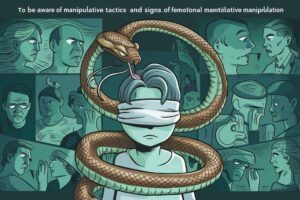How to Identify Seductive Emotional Manipulation?
Emotional manipulation is a sophisticated form of psychological control that seeks to exploit a person’s emotions in order to achieve a desired outcome. This type of manipulation is often subtle and insidious, making it difficult for the victim to recognize and resist.
Manipulators use tactics such as guilt-tripping, gaslighting, and playing the victim to manipulate their targets into doing what they want. The ultimate goal of emotional manipulation is to gain power and control over another person, often at the expense of their emotional well-being and autonomy.
Identifying and understanding emotional manipulation is crucial in protecting oneself from being exploited in personal and professional relationships. By educating oneself on the tactics and warning signs of emotional manipulation, individuals can empower themselves to set boundaries and assert their own needs and desires.
Building emotional intelligence and self-awareness is key in recognizing when one is being manipulated and taking steps to counteract this harmful behavior.
Ultimately, confronting emotional manipulation requires courage and self-confidence, as well as a willingness to prioritize one’s own mental and emotional well-being over appeasing the manipulator.

Table of Contents
ToggleImpact of Emotional Manipulation on Relationships
Emotional manipulation can have a profound impact on relationships, as it involves controlling tactics and behaviors used to deceive or coerce partners into doing something they may not want to do.
This form of manipulation can create a toxic dynamic in the relationship, eroding trust and causing emotional harm to the individuals involved. It can also lead to a power imbalance, with one partner holding all the control and using manipulative tactics to maintain their dominance in the relationship.
This can ultimately lead to feelings of resentment, anger, and hurt, which can damage the emotional connection between partners and even lead to the dissolution of the relationship.
Moreover, emotional manipulation can have long-lasting effects on individuals, as it can undermine their self-esteem and sense of worth. When a person is constantly subjected to manipulative tactics, they may begin to doubt themselves and their own feelings, which can create a sense of confusion and emotional distress.

This can create a cycle of emotional dependence on the manipulator, as the victim may feel compelled to seek validation and approval from their partner, even if it comes at the cost of their own well-being.
Ultimately, emotional manipulation can have a detrimental impact on relationships, as it can erode the foundation of trust and intimacy, leading to feelings of insecurity and emotional turmoil for all parties involved.
Read more about “What Does Love Bombing Mean and ways to overcome?”
Key Tactics of Emotional Manipulation
Emotional manipulation is a complex and often insidious tactic used by individuals to control and manipulate others’ feelings and behaviors for their own gain. One key tactic of emotional manipulation is gaslighting, where the manipulator tries to distort the victim’s sense of reality and make them doubt their own perceptions.
Another tactic is guilt-tripping, where the manipulator uses tactics such as shame or blame to make the victim feel guilty and responsible for their own unhappiness.
Additionally, love-bombing is another common tactic, where the manipulator overwhelms the victim with flattery and affection in order to gain their trust and manipulate their emotions.
By understanding these key tactics of emotional manipulation, individuals can empower themselves to recognize and combat such manipulative behaviors in their relationships and interactions.
Read more about “How to Safeguard Yourself from Toxic Relationships?”
Signs of Seductive Emotional Manipulation in a Relationship
Emotional manipulation in a relationship can often be subtle and difficult to detect, but there are certain signs that can indicate the presence of seductive tactics being used to control or manipulate a partner. One common sign is excessive flattery or compliments that are used to charm and manipulate the emotions of the other person.
This can involve showering the partner with praise and attention in order to make them feel special and wanted, but in reality, it may be a tactic used to gain power and influence over the other person.
Additionally, emotional manipulation can involve gaslighting, which is a form of psychological manipulation that seeks to make the target doubt their own perceptions or memories. This can involve denying that certain events occurred or manipulating the truth in order to confuse and disorient the partner.

Another sign of seductive emotional manipulation in a relationship is isolation from friends and family. This can involve the manipulator encouraging the partner to spend less time with their loved ones, or even actively sabotaging their relationships with others in order to increase dependency on the manipulator.
By isolating the partner from their support system, the manipulator gains more control over their emotions and decisions, making it easier to manipulate and exploit them. Additionally, emotional manipulation can involve guilt-tripping and emotional blackmail, where the manipulator uses guilt and shame to control the partner’s behavior and emotions.
By making the partner feel guilty for not meeting their needs or desires, the manipulator can manipulate them into doing things they wouldn’t otherwise want to do, thus further entrenching their control over the relationship.
Read more about “What are the Signs of Emotional Exploitation?”
Gaslighting Tactics used to Manipulate Emotions and Perceptions
Gaslighting is a form of psychological manipulation that involves subtly distorting someone’s perception of reality in order to gain control over them.
This tactic can be used to manipulate emotions and perception by invalidating the other person’s feelings or experiences, making them doubt their own memories, and projecting their own behaviors onto the victim. Gaslighting can be incredibly damaging, as it can lead the victim to question their own sanity and reality.
Read more about “How to Evaluate a Narcissist Partner Behavior?”
It is important to be aware of these tactics and to seek help if you suspect that you are being gaslighted, as it can have serious consequences for mental health and well-being.

How to Recognize Guilt-Tripping and Emotional Blackmail Techniques?
Guilt-tripping and emotional manipulation are commonly used tactics in interpersonal relationships to control or influence the behavior and emotions of others. It is important to be able to recognize when someone is employing these techniques so that one can protect themselves from being manipulated.
One way to identify guilt-tripping is when someone constantly brings up past mistakes or wrongdoings in order to make the other person feel guilty or ashamed. This can be done through subtle remarks or passive-aggressive behavior that aims to elicit a sense of guilt or responsibility in the victim.

Additionally, emotional manipulation often involves the use of fear, shame, or insecurity to control the emotions of the other person. This can include threats of abandonment or punishment if the victim does not comply with the manipulator’s demands.
Another common sign of emotional manipulation is when someone uses exaggeration or dramatic expressions of emotion to elicit a certain response from the victim.
This can include playing the victim, making unrealistic demands, or using emotional outbursts to guilt trip the other person into feeling sorry for them or giving in to their wishes.
It is important to be aware of these tactics and to set boundaries with individuals who use them in order to protect one’s own emotional well-being.
By recognizing the signs of guilt-tripping and emotional manipulation, one can assert their own boundaries and maintain healthy relationships based on mutual respect and understanding.
Setting Boundaries and Protecting Yourself from Emotional Manipulation
Setting boundaries and protecting oneself from emotional manipulation is a vital aspect of maintaining healthy relationships and psychological well-being.
Emotional manipulation can often go unnoticed, as it can be subtle and insidious. By establishing clear boundaries and communicating assertively, individuals can protect themselves from being manipulated or taken advantage of. It is important to recognize when manipulation is occurring and to address it promptly to prevent further harm.
Being able to identify manipulative behaviors and respond with confidence and self-assurance is paramount in safeguarding one’s emotional health.
By prioritizing self-care and maintaining healthy boundaries, individuals can cultivate strong and fulfilling relationships while safeguarding their emotional well-being.

Looking For Support and Guidance
Emotional manipulation is a subtle yet damaging form of abuse that can have far-reaching consequences on an individual’s mental health and well-being.
Seeking support from friends can be a crucial step in breaking free from the grip of emotional manipulation. Friends can provide a listening ear, offer validation of the victim’s experiences, and provide a fresh perspective on the situation at hand.
By confiding in trusted friends, victims of emotional manipulation can gain the strength and encouragement needed to set boundaries, assert themselves, and ultimately break free from the cycle of abuse.
It is important for individuals to surround themselves with a supportive network of friends who can offer love, understanding, and guidance in navigating the complexities of emotional manipulation.
Self-reflection on Personal Vulnerabilities to Prevent Future Manipulation
Self-reflection on personal vulnerabilities is crucial in preventing future instances of seductive emotional manipulation. By taking the time to analyze our own insecurities, past traumas, and weaknesses, we can become more aware of how others may exploit these vulnerabilities for their own gain.
This introspective practice allows us to build resilience and self-confidence, making it harder for manipulative individuals to prey on our emotions. Additionally, recognizing and addressing our vulnerabilities can help us set clearer boundaries and assert ourselves in challenging situations.
In a professional setting, it is imperative to cultivate self-awareness and emotional intelligence in order to navigate complex interactions with coworkers, clients, and superiors. Engaging in ongoing self-reflection not only protects us from manipulation but also fosters personal growth and enhances our overall well-being.
Importance of Communication and Assertiveness in Healthy Relationships
Effective communication and assertiveness are vital components of healthy relationships, whether they be personal or professional. Clear and open communication helps to avoid misunderstandings, build trust, and strengthen the bond between individuals.
By expressing thoughts, feelings, and needs in a respectful manner, partners can work together to resolve conflicts and make decisions that benefit both parties.
Assertiveness plays a key role in setting boundaries, standing up for oneself, and advocating for one’s own needs within a relationship. It helps individuals feel empowered and respected while maintaining self-respect and dignity.
Without proper communication and assertiveness skills, relationships can suffer from miscommunication, resentment and power imbalances that ultimately lead to dissatisfaction and breakdowns. Therefore, it is crucial for individuals to develop these skills in order to foster healthy and thriving relationships in their lives.
Resources for Further Reading on Emotional Manipulation and Toxic Behaviors
For individuals seeking to further educate themselves on the topic of emotional manipulation and toxic behaviors, there are a multitude of valuable resources available.
One highly recommended option is the book “In Sheep’s Clothing: Understanding and Dealing with Manipulative People” by Dr. George K. Simon. This comprehensive guide offers insights into recognizing manipulative tactics and provides practical strategies for effectively managing manipulative individuals in various contexts.
Additionally, the website PsychCentral.com offers a plethora of articles and resources related to emotional manipulation and toxic behaviors, providing readers with accessible information and support on navigating these complex dynamics.
Furthermore, online communities such as Reddit’s r/raisedbynarcissists can serve as a valuable platform for individuals to share experiences, seek advice, and gain perspective from others who have encountered similar challenges.
By delving into these resources, individuals can deepen their understanding of emotional manipulation and develop strategies for maintaining healthy boundaries in their relationships.
Conclusion:
In conclusion, empowering oneself to identify and address seductive emotional manipulation tactics is crucial in maintaining personal boundaries and relationships.
By becoming aware of these tactics, such as gaslighting, guilt-tripping, or love bombing, individuals can protect themselves from being manipulated or controlled by others.
Recognizing the signs of these behaviors, understanding their impact on emotions and behavior, and developing assertiveness skills are essential components of empowerment in addressing emotional manipulation effectively.
It is important to establish clear communication and boundaries with individuals who exhibit manipulative behavior while also seeking support from trusted friends, family members, or professionals if needed.
By taking proactive steps to understand and confront these tactics, one can foster healthier relationships built on mutual respect and trust.
FREQUENTLY ASKED QUESTIONS
1. How can I differentiate between genuine affection and love bombing?
When differentiating between genuine affection and love bombing, it is important to consider the intent behind the actions and behaviors of the individual in question. Genuine affection typically comes from a place of sincerity, consistency, and mutual respect in a relationship. It involves building trust gradually over time, showing empathy, and actively listening to each other’s needs.
On the other hand, love bombing is characterized by overwhelming displays of affection and attention that can feel excessive or insincere. It often involves grand gestures, intense flattery, and continuous praise as a means to manipulate or control the other person. In order to differentiate between the two, it is crucial to pay attention to red flags such as quick declarations of love, possessiveness, inconsistency in behavior, and pressure for commitment early on in the relationship. Taking note of these signs can help individuals protect themselves from potentially harmful dynamics disguised as love.
2. Is it possible for someone to unknowingly engage in emotional manipulation?
Emotional manipulation can often be subtle and difficult to detect, which is why it is indeed possible for someone to unknowingly engage in this behavior. In some cases, individuals may manipulate others without even realizing the impact of their words or actions. For example, they may use guilt-tripping or passive-aggressive tactics as a means of getting what they want, without fully understanding the manipulative nature of their behavior.
Additionally, cultural norms and upbringing can play a role in perpetuating patterns of emotional manipulation, as individuals may have learned these behaviors from family members or society at large. It is crucial for individuals to educate themselves on the signs and effects of emotional manipulation in order to prevent inadvertently engaging in harmful behaviors towards others.
3. What are some red flags that indicate I may be a victim of emotional manipulation?
Some red flags that may indicate you are a victim of emotional manipulation include feeling constantly anxious or on edge, having trouble making decisions on your own without seeking approval from the manipulator, feeling guilty or responsible for their behavior or emotions, experiencing frequent mood swings or extreme emotions due to interactions with the manipulator, and noticing a pattern of belittling comments disguised as jokes or concern.
Additionally, if you find yourself constantly apologizing or changing your behavior to avoid conflict with the manipulator, this could be a sign that they are exerting control over you through emotional manipulation tactics. It is important to recognize these red flags and seek support from trusted friends, family members, or mental health professionals to address and overcome these harmful dynamics.
4. How can I effectively communicate my boundaries to prevent emotional manipulation in my relationships?
Effective communication of boundaries is essential in preventing emotional manipulation in a relationship. It is important to clearly and assertively communicate your boundaries to your partner, ensuring they understand what is acceptable and what is not. Use clear language, be direct, and stick to the facts when discussing your boundaries.
Be open and honest about how certain behaviors make you feel and articulate the consequences of crossing those boundaries. Additionally, set firm consequences for boundary violations to show that you are serious about enforcing them. Practice self-care and prioritize your well-being by standing up for yourself in a calm and composed manner when your boundaries are being tested. Ultimately, establishing strong communication around boundaries is key in fostering a healthy and respectful relationship dynamic free from emotional manipulation.


